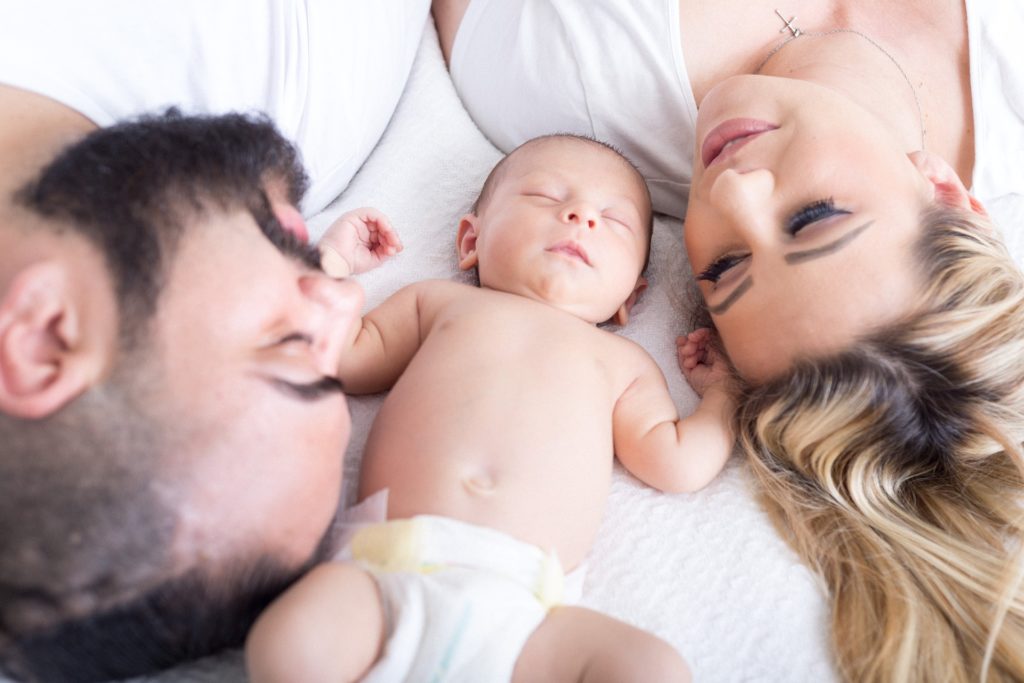When you first bring your baby home, they will be so tiny and delicate and will spend a lot of their time sleeping. Within the first three months, your child’s growth and development brings a lot of exciting changes. Your munchkin will learn how to turn, smile, follow you with their eyes, and coo in an attempt to strike a conversation.
To give you an idea of what you should expect in your baby’s development within the first three months, we will look at the five growth and development areas:
· Physical growth
· Cognitive development
· Emotional development
· Language development
· Sensory and motor development
Table of Contents
What physical development to expect
Coming into the world is a scary thing for babies. During the first three months, your little one’s digestive system will develop fully and start functioning smoothly.
Babies are also not sure of what is happening around them. It is not surprising that your little one will become upset if they are given too much to handle. Shapes, colors, sounds can easily overwhelm your baby so introduce them in small doses.
Your baby will also add about 2.5kgs during this time, and grow about 3 inches in height. You will probably not be able to remember how tiny they were by month 3.
Giving your baby tummy time is vital during their first three months in this world. This time helps them strengthen their neck muscles. By three months your baby will be able to lift his head and raise his chest while lying on their tummy.
Your little one will be able to lift their upper body using their arms while lying on their stomach.
Your baby can stretch, kick their little legs and play around with their hands.
Some babies learn how to turn from back to front by this time. Make sure that you are observing to prevent accidents.
Your baby is still not aware that their hands and feet belong to them. Do not be surprised when they are fascinated by their own hands and feet. However, they begin to coordinate the use of their hands and eyes during this period of growth.
They can open palms and close them. Hand them a toy and see if they can grip on it. You will even notice that they can bring their hands to their mouth and suckle on their little fingers.
Your baby will be able to push down their little legs. Some babies will bend their knees and discover that they can bounce.
How to encourage your baby’s physical development
· Hold bright colored toys in front of them, so they try to grab the toy
· When they open their palm, give them your finger or a toy to grab on
· Strap a toy around your baby’s ankle so they can make a sound with their feet
· Give them enough tummy time
Cognitive baby development milestones
Cognitive development in your baby refers to the process by which your baby learns how to coordinate their body parts, cope with perception, and develop thought memory.
By the time they are three months, your baby will be able to follow moving objects. You will see your baby busy trying to figure out what is happening which is great for their brain development.
Your baby will also start learning cause and effect. When they shake a toy, it makes a sound. When they hit the toy, it moves. When they open their little palm, the doll falls off.
Babies will also turn their heads towards sounds when they hear them. If you are in a different room, try standing at the door and talk to your baby. You will notice that they will turn their head towards you. If they do not see you at first, move a little closer and try again.
Your little munchkin will also be able to recognize new sounds. You may notice them become startled when they hear something for the first time. They are getting familiar with the sound and taking it all in. This may be upsetting from time to time so be ready to sooth.
Kids at this age can imitate some of the things you are doing. For example, when you smile, your little one will smile back. When you sing to them and clap your hands, you may notice them trying to do the same.
To help your cute little munchkin enhance their cognitive development:
· Read books and have them follow the pictures
· Talk to them in different pitches, emotions and from different angles/places
· Help them engage with toys that make sounds to learn cause and effect
· Sing to your little one
Your Baby’s Social-Emotional development
When your baby is first born, they do not know who they are, or who is taking care of them. Their first emotional interaction was looking at you when they were born. As time passes, the quick look becomes a more extended gaze as your little one studies and masters your face.
By the time baby is three months, they can see clearly within 13 inches while everything further than that remains fuzzy.
Your baby will also learn to respond to touch and feel comforted when you (or a familiar face) picks them up when they cry.
Little munchkins also show and respond to social stimulation by smiling when something makes them happy. At first, the baby will just be exercising muscles, but soon you will realize that there is meaning behind their smile.
To encourage the growth of your little one’s social-emotional skills:
· Spend time looking at them so that they can study your face
· Play social games such as peek-a-boo or make faces
· When your baby makes cooing sounds, imitate them to encourage a mini conversation
Language Development
Newborns communicate through crying. If you listen carefully, you will be able to identify the different cries your baby uses when they have a different need. This may take some weeks to define clearly, but soon you will tell when they are hungry, need a change or want to play.
Responding to your baby immediately is very important. It shows your baby that they can count on you and this helps them develop a sense of security and comfort.
By the time your baby is week 7, they will discover their voice by making cooing sounds. Your little munchkin will even initiate a conversation with a smile and body language. Encourage them by smiling back and talk to them.
You can encourage your child’s language skills through:
· Making faces for different emotions and watching their response
· Speaking to them and using their name
· Using music, either played or singing to your baby
· Looking at your baby when you are addressing them
· Copy their gestures, and sounds to encourage conversation
Sensory and motor baby development by month 3
As your baby develops during these months, they will find it easier to move their hands, fingers, and legs as well as turn from side to side to suckle and look at you or interesting objects.
Kicking their legs will become a fascinating activity, as will playing with their hands. Your little one will also be able to lift themselves during tummy time.
Some babies will even be able to turn when lying down so that they can be on their tummy. This is great and will come in handy when they are about to crawl.
When you should be worried about baby’s development
You will find instances where a child will not develop as fast as other kids. Your little one may be working on a different area of development. Most times there is no reason to panic, but it is advisable to trust your instincts at all times. However, if you see the following signs, it would be best to consult your doctor.
· Minimal to no improvement on head control
· Unable to grasp or hold items
· Does not smile at people or your voice
· Non-response to visual and sound cues
· One side (legs and hands) seem stronger than the other
· Unable to lift their upper body by the end of month 3
It may seem like a roller-coaster when you first bring your baby home. All they will do is eat, cry and sleep but soon, your little one responds to smile, plays and cooing. Baby growth and development by month three is drastic and fun. Your baby learns a ton of new skills which help them adapt to lif




